- Home
- Laini Taylor
Strange the Dreamer Page 5
Strange the Dreamer Read online
Page 5
Thyon stared at him several beats too long. “What is the meaning of this?” he asked at last, and his voice was ice and danger. “A dare? Did you lose a bet? Is it a joke?”
“What?” Startled, Lazlo shook his head. His face went hot and his hands went cold. “No,” he said, seeing Thyon’s incredulity now for what it was. It wasn’t Lazlo’s premise he was reacting to. It was his presence. In an instant, Lazlo’s perception shifted and he understood what he’d just done. He—Strange the dreamer, junior librarian—had marched into the Chrysopoesium, brandishing a book of fairy tales, and presumed to share his insights on the deepest mystery of alchemy. As though he might solve the problem that had eluded centuries of alchemists—including Nero himself.
His own audacity, now that he saw it, took his breath away. How could he have thought this was a good idea?
“Tell me the truth,” commanded Thyon. “Who was it? Master Luzinay? He sent you here to mock me, didn’t he?”
Lazlo shook his head to deny the accusation, but he could tell that Thyon wasn’t even seeing him. He was too lost in his own fury and misery. If he was seeing anything, it was the mocking faces of the other alchemists, or the cool calculations of the queen herself, ordering up miracles like breakfast. Or maybe—probably—he was seeing the scorn on his father’s face last night, and feeling it in the rawness of his flesh and the ache of his every movement. There was, in him, such a simmer of emotions, like chemicals thrown together in an alembic: fear like a sulfur fog, bitterness as sharp as salt, and damned fickle mercury for failure and desperation.
“I would never mock you,” Lazlo insisted.
Thyon grabbed up the book, flipping it closed to study the title and cover. “Miracles for Breakfast,” he intoned, leafing through it. There were pictures of mermaids, witches. “This isn’t mockery?”
“I swear it isn’t. I may be wrong, my lord. I… I probably am.” Lazlo saw how it looked, and he wanted to tell what he knew to be true, how folklore was sprinkled with truths, but even that sounded absurd to him now—crumbs on wizards’ beards and all that nonsense. “I’m sorry. It was presumptuous to come here and I beg your pardon, but I swear to you I meant no disrespect. I only wanted to help you.”
Thyon snapped the book shut. “To help me. You, help me.” He actually laughed. It was a cold, hard sound, like ice shattering. It went on too long, and with every new bite of laughter, Lazlo felt himself grow smaller. “Enlighten me, Strange,” said Thyon. “In what version of the world could you possibly help me?”
In what version of the world? Was there more than one? Was there a version where Lazlo grew up with a name and a family, and Thyon was put on the cart for the abbey? Lazlo couldn’t see it. For all his grand imagination, he couldn’t conjure an image of a monk shaving that golden head. “Of course you’re right,” he stammered. “I only thought… you shouldn’t have to bear it all alone.”
It was… the wrong thing to say.
“Bear what all alone?” asked Thyon, query sharp in his eyes.
Lazlo saw his mistake. He froze, much as he had in the tombwalk, hiding uselessly in the shadows. There was no hiding here, though, and because there was no guile in him, everything he felt showed on his face. Shock. Outrage.
Pity.
And finally Thyon understood what had brought this junior librarian to his door in the earliest hours of dawn. If Lazlo had waited—weeks or even days—Thyon might not have made the connection so instantly. But his back was on fire with pain, and Lazlo’s glance strayed there as though he knew it. Poor Thyon, whose father beat him. In an instant he knew that Lazlo had seen him at his weakest, and the simmer of emotions were joined by one more.
It was shame. And it ignited all the others.
“I’m sorry,” Lazlo said, hardly knowing what he was sorry for—that Thyon had been beaten, or that he had chanced to see it.
“Don’t you dare pity me, you nothing,” Thyon snarled with such venom in his voice that Lazlo flinched back as if stung.
What followed was a terrible, sickening blur of spite and outrage. A red and twisted face. Bared teeth and clenched fists and glass shattering. It all got twisted up in nightmares in the days that followed, and embellished by Lazlo’s horror and regret. He stumbled out the door, and maybe a hand gave him a shove, and maybe it didn’t. Maybe he just tripped and sprawled down the short flight of steps, biting into his tongue so his mouth filled with blood. And he was swallowing blood, trying to look normal as he made his way, limping, back to the main palace.
He’d reached the steps before he realized he’d left the book behind. No more miracles for breakfast. No breakfast at all, not today with his bitten tongue swelling in his mouth. And he hadn’t eaten dinner the night before, or slept, but he was so far from hungry or tired, and he had some time to collect himself before his shift began, so he did. He bathed his face in cool water, and winced and rinsed his mouth out, spitting red into the basin. His tongue was grisly, the throb and sting seeming to fill his head. He didn’t speak a word all day and no one even noticed. He feared Thyon would have him fired, and he was braced for it, but it didn’t happen. Nothing happened. No one found out what he’d done that morning. No one missed the book, either, except for him, and he missed it very much.
Three weeks later, he heard the news. The queen was coming to the Great Library. It was the first time she’d visited since the dedication of the Chrysopoesium, which, it would appear, had been a wise investment.
Thyon Nero had made gold.
6
PAPER, INK, AND YEARS
Coincidence?
For hundreds of years, alchemists had been trying to distill azoth. Three weeks after Lazlo’s visit to the Chrysopoesium, Thyon Nero did it. Lazlo had his suspicions, but they were only suspicions—until, that is, he opened the door to his room and found Thyon in it.
Lazlo’s pulse stammered. His books were spilled onto the floor, their pages creased beneath them like the broken wings of birds. Thyon held one in his hands. It was Lazlo’s finest, its binding nearly worthy of the Pavilion of Thought. He’d even illuminated the spine with flakes of leftover gold leaf it took him three years to save. The Unseen City, it read, in the calligraphy he’d learned at the abbey.
It hit the floor with a slap, and Lazlo felt it in his hearts. He wanted to stoop and pick it up, but he just stood there on his own threshold and stared at the intruder, so composed, so elegant, and as out of place in the dingy little room as a sunbeam in a cellar.
“Does anyone know that you came to the Chrysopoesium?” Thyon asked.
Slowly, Lazlo shook his head.
“And the book. Does anybody else know about it?”
And there it was. There was no coincidence. Lazlo had been right. Spirit was the key to azoth. It was almost funny—not just that the truth had been found in a fairy tale, but that the great secret ingredient should prove so common a thing as a bodily fluid. Every alchemist who had ever lived and died in search of it had had the answer all the time, running through his very veins.
If the truth were to be known, anyone with a pot and a fire would try to make gold, drawing spirit from their veins, or stealing it from others. It wouldn’t be so precious then, and nor would the golden godson be so special. With that, he understood what was at stake. Thyon meant to keep the secret of azoth at all costs.
And Lazlo was a cost.
He considered lying, but could think of no lie that might protect him. Hesitant, he shook his head again, and he thought he had never been so aware of anything as he was aware of Thyon’s hand on the hilt of his sword.
Time slowed. He watched Thyon’s knuckles whiten, saw the span of visible steel lengthen as the sword was drawn up and out of its sheath. It had a curve to it, like a rib. It had a mirror brightness in the glavelight, and caught gold in it, and gray. Lazlo’s eyes locked with Thyon’s. He saw calculation there, as Thyon weighed the trouble of killing him with the risk of letting him live.
And he knew how that calculus w
ould come out. With him alive, there would always be someone who knew the secret, while killing him would be no trouble at all. Thyon might leave his engraved ancestral sword skewered through Lazlo’s corpse, and it would be returned to him cleaned. The whole thing would simply be tidied away. Someone like Nero might do as he liked to someone like Lazlo.
But… he didn’t.
He sheathed the blade. “You will never speak of it,” he said. “You will never write of it. No one will ever know. Do you understand me?”
“Yes,” said Lazlo, hoarse.
“Swear to it,” Thyon ordered, but then he cast his eyes over the books on the floor and abruptly changed his mind. “On second thought, don’t swear.” His lips curved in a subtle jeer. “Promise me three times.”
Lazlo was startled. A triple promise? It was a child’s vow from fairy tales, where breaking it was a curse, and it was more powerful to Lazlo than any vow on god or monarch would have been. “I promise,” he said, shaking with the chill of his own near death. “I promise,” he said again, and his face was hot and burning. “I promise.”
The words, repeated, had the rhythm of an incantation, and they were the last that passed between the two young men for more than four years. Until the day the golden godson came in person to the Enquiries desk to requisition Lazlo’s books.
The Complete Works of Lazlo Strange.
Gripping the request form, Lazlo’s hands shook. The books were his, and they were all that was his. He’d made them, and he loved them in the way one loves things that come of one’s own hands, but even that wasn’t the extent of it. They weren’t just a collection of notes. They were where he kept his impossible dream—every discovery he’d made about the Unseen City, every piece he’d puzzled into place. And it wasn’t for the simple accumulation of knowledge, but with the goal of one day… circumventing impossibility. Of somehow going there, where no outsider had ever been. Of crossing the desert, seeing those glittering domes with his own eyes, and finding out, at last, what happened to the Unseen City.
His books were a seven-year-long record of his hopes. Even touching them gave him courage. And now they were to fall into Thyon Nero’s hands?
“What in the world,” Master Hyrrokkin had asked, “could Thyon Nero want with your books?”
“I don’t know,” said Lazlo, at a loss. “Nothing. Only to take them away from me.”
The old man clucked his tongue. “Surely such pettiness is beneath him.”
“You think so? Well, then perhaps he intends to read them cover to cover.”
Lazlo’s tone was flat, and Master Hyrrokkin took his point. That scenario was indeed the more ridiculous. “But why?” Hyrrokkin persisted. “Why should he want to take them away from you?”
And Lazlo couldn’t tell him that. What he himself was wondering was: Why now, four years later? He had done nothing to break his promise, or to draw Nero’s ire in any way. “Because he can?” he asked, bleak.
He fought the requisition. Of course he did. He went straight to the master of archives to plead his case. The books were his own, he said, and not property of the library. It had always been made clear that the expertise of librarians was unworthy of the term scholarship. As such, how could they now be claimed? It was contradictory and unjust.
“Unjust? You ought to be proud, young man,” Villiers, the master, told him. “Thyon Nero has taken an interest in your work. It’s a great day for you.”
A great day indeed. For seven years, Lazlo had been “Strange the dreamer,” and his books had been “scribblings” and “foolishness.” Now, just like that, they were his “work,” validated and stolen in one fell swoop.
“Please,” he begged, urgent and hushed. “Please don’t give him my books.”
And… they didn’t.
They made him do it.
“You’re disgracing yourself,” Villiers snapped. “And I won’t have you disgrace the library, too. He’s the golden godson, not some thief in the stacks. He’ll return them when he’s done with them. Now be off with you.”
And so he had no choice. He loaded them into a crate and onto a handcart and trundled them out of the library, through the front gates, and down the long road that spiraled around Zosimos Ridge. He paused and looked out. The Eder sparkled in the sun, the rich brown of a pretty girl’s eyes. The New Palace arched across it, as fantastical as a painted backdrop in a fairy play. Birds wheeled over the fishing docks, and a long golden pennant flew from the cupola of Nero’s pale-pink palace. Lazlo made his slow way there. Rang the bell with deep reluctance. Remembered ringing another bell four years earlier, with Miracles for Breakfast clutched in his hands. He’d never seen it again. Would these books be any different?
A butler answered. He bid Lazlo leave the crate, but Lazlo refused. “I must see Lord Nero,” he said, and when Thyon at last presented himself, Lazlo asked him simply, “Why?”
“Why?” The alchemist was in his shirtsleeves, without his scarlet cravat. His blade was in its place, though, and his hand rested casually on its hilt. “I’ve always wanted to ask you that, you know.”
“Me?”
“Yes. Why, Strange? Why did you give it to me?” It? The secret, and all that followed. “When you might have kept it, and been someone yourself.”
The truth was—and nothing would have persuaded Nero to believe it—that it had never occurred to Lazlo to seek his own advantage. In the tombwalk that day, it had been very clear to him: Here was a story of greedy queens and wicked fathers and war on the horizon, and… it wasn’t his story. It was Thyon’s. To take it for himself… it would have been stealing. It was as simple as that. “I am someone,” he said. He gestured to the crate. “That’s who I am.” And then, with quiet intensity, “Don’t take them. Please.”
There was a moment, very brief, when the guarded dispassion fell away from Thyon’s face, and Lazlo saw something human in him. Regretful, even. Then it was gone. “Remember your promise,” he warned, and shut the door in Lazlo’s face.
Lazlo returned to his room late that evening, having lingered at dinner to avoid it. Reaching his door, he took his glave down off its hook, hesitated, then hung it back up. With a deep breath, he entered. He hoped that darkness might soften the loss, but there was just enough moonlight to bathe his window ledge in a soft glow. Its emptiness was stark. The room felt hollow and dead, like a body with its hearts cut out. Breathing wasn’t easy. He dropped onto the edge of his bed. “They’re only books,” he told himself. Just paper and ink.
Paper, ink, and years.
Paper, ink, years, and his dream.
He shook his head. His dream was in his mind and in his soul. Thyon might steal his books, but he couldn’t steal that.
That was what he told himself that first long night bereft of his books, and he had trouble falling asleep for wondering where they were and what Nero had done to them. He might have burned them, or put them into a moldering cellar. He might even now be pulling them apart page by page, folding them into birds, and launching them off his high widow’s walk, one by one.
When he finally did sleep, Lazlo dreamed his books were buried beneath the earth, and that the blades of grass that grew up from them whispered “Weep, Weep” when the winds blew, and all who heard it felt tears prick their eyes.
Never once did he consider that Thyon might be reading them. That, in a room as opulent as Lazlo’s was plain, with his feet up on a tufted stool and a glave on either side, he was reading long into the night while servants brought him tea, and supper, and tea again. Lazlo certainly never imagined him taking notes, with a swan quill and octopus ink from an inkwell of inlaid lys that had actually come from Weep some five hundred years ago. His handsome face was devoid of mockery or malice, and was instead intent, alive, and fascinated.
Which was so much worse.
Because if Lazlo thought a dream could not be stolen, he underestimated Thyon Nero.
7
IMPOSSIBLE DREAM
Without his books, L
azlo felt as though a vital link to his dream had been cut. The Unseen City had never seemed more distant, or more out of reach. It was as though a fog had lifted, forcing him to confront an uncomfortable truth.
His books were not his dream. Moreover, he had tucked his dream into their pages like a bookmark and been content to leave it there for too long. The fact was: Nothing he might ever do or read or find inside the Great Library of Zosma was going to bring him one step closer to Weep. Only a journey would do that.
Easier said than done, of course. It was so very far. He might conceivably find a way of reaching Alkonost, the crossroads of the continent and western outpost of the Elmuthaleth. He had no qualifications to recommend him, but there was at least a chance he could hire onto a merchant convoy and work his way there. After that, though, he would be on his own. No guide would take faranji across the desert. They wouldn’t even sell them camels so that they might make the attempt on their own—which would be suicide in any case.
And even supposing he somehow managed to cross the desert, there would still be the Cusp to confront: the mountain of white glass said in legend to be the funeral pyre of demons. There was only one way over it, and that was through the gates of Fort Misrach, where faranji were executed as spies.
If the city was dead, then he might get through to explore its ruins. The thought was unutterably sad. He didn’t want to find ruins, but a city full of life and color, like the one from the stories. But if the city was alive, then he could expect to be drawn and quartered and fed in pieces to the carrion birds.
It wasn’t hard to see why he’d tucked his dream into his books for safekeeping. But now it was all he had left, and he had to take a good, hard look at it. It wasn’t encouraging. Whatever way he turned it, all he saw was: impossible. If the dream chose the dreamer, then his had chosen poorly. It needed someone far more daring than he. It needed the thunder and the avalanche, the war cry and the whirlwind. It needed fire.

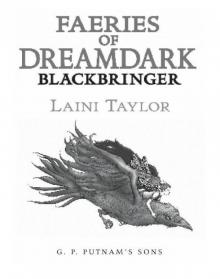 Blackbringer
Blackbringer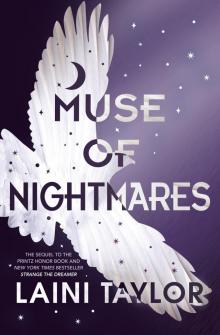 Muse of Nightmares
Muse of Nightmares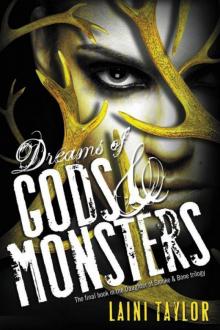 Dreams of Gods & Monsters
Dreams of Gods & Monsters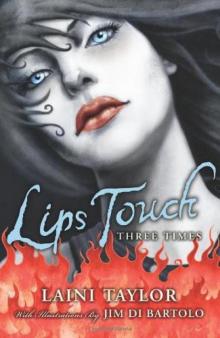 Lips Touch: Three Times
Lips Touch: Three Times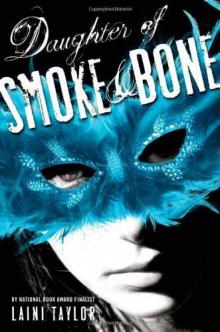 Daughter of Smoke & Bone
Daughter of Smoke & Bone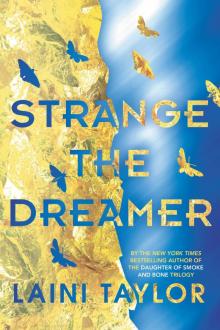 Strange the Dreamer
Strange the Dreamer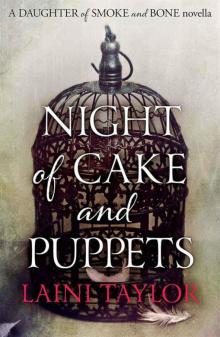 Night of Cake & Puppets
Night of Cake & Puppets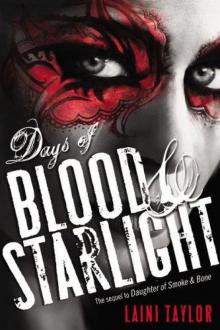 Days of Blood & Starlight
Days of Blood & Starlight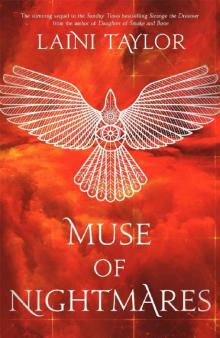 Muse of Nightmares (Strange the Dreamer #2_UK)
Muse of Nightmares (Strange the Dreamer #2_UK)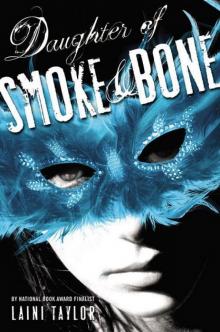 Daughter of Smoke and Bone dosab-1
Daughter of Smoke and Bone dosab-1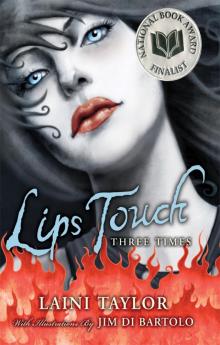 Three Times
Three Times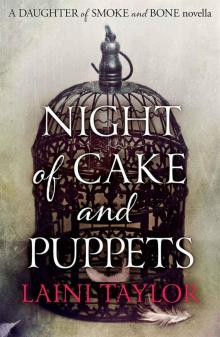 Night of Cake and Puppets (a Daughter of Smoke and Bone novella)
Night of Cake and Puppets (a Daughter of Smoke and Bone novella)